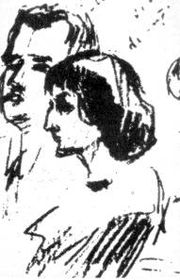
Mikhail Lozinsky
Encyclopedia

Anna Akhmatova
Anna Andreyevna Gorenko , better known by the pen name Anna Akhmatova , was a Russian and Soviet modernist poet, one of the most acclaimed writers in the Russian canon.Harrington p11...
, "Lozinsky was for the twentieth century what Zhukovsky
Vasily Zhukovsky
Vasily Andreyevich Zhukovsky was the foremost Russian poet of the 1810s and a leading figure in Russian literature in the first half of the 19th century...
was for the nineteenth." Lozinsky's granddaughters include writers Tatyana Tolstaya
Tatyana Tolstaya
Tatyana Nikitichna Tolstaya is a Russian writer, TV host, publicist, novelist, and essayist from the Tolstoy family.- Family :She was born into a family of rich literary tradition. Her paternal grandfather was Aleksei Nikolaevich Tolstoi, an important Russian-Soviet writer known as 'the Red...
and Natalia Tolstaya
Natalia Tolstaya
Natalia Nikitichna Tolstaya was a Russian writer and translator from the Tolstoy family. She was a granddaughter of writer Alexei Tolstoy and poet Mikhail Lozinsky, and sister of the writer Tatyana Tolstaya. She taught for many years at Saint Petersburg State University, from which she had also...
.
Lozinsky was born in Gatchina
Gatchina
Gatchina is a town and the administrative center of Gatchinsky District of Leningrad Oblast, Russia, located south of St. Petersburg by the road leading to Pskov...
and spent his life in St. Petersburg. His uncle was married to an aunt of Alexander Blok
Alexander Blok
Alexander Alexandrovich Blok was a Russian lyrical poet.-Life and career:Blok was born in Saint Petersburg, into a sophisticated and intellectual family. Some of his relatives were literary men, his father being a law professor in Warsaw, and his maternal grandfather the rector of Saint Petersburg...
, who was one of the first to appreciate Lozinsky's highly polished verse. During the Silver Age of Russian Poetry
Silver Age of Russian Poetry
Silver Age is a term traditionally applied by Russian philologists to the first two decades of the 20th century. It was an exceptionally creative period in the history of Russian poetry, on par with the Golden Age a century earlier...
he was close to the Acmeist circle of Nikolay Gumilyov
Nikolay Gumilyov
Nikolay Stepanovich Gumilev was an influential Russian poet who founded the acmeism movement.-Early life and poems:Nikolai was born in the town of Kronstadt on Kotlin Island, into the family of Stepan Yakovlevich Gumilev , a naval physician, and Anna Ivanovna L'vova . His childhood nickname was...
; he was briefly arrested and interrogated following the latter's execution.
Despite his impeccable craftsmanship, Lozinsky's poetry failed to attract public attention owing to its lack of substance and originality. Lozinsky therefore began applying his literary skills to the translation of works by notable non-Russian literary figures such as Benvenuto Cellini
Benvenuto Cellini
Benvenuto Cellini was an Italian goldsmith, sculptor, painter, soldier and musician, who also wrote a famous autobiography. He was one of the most important artists of Mannerism.-Youth:...
, Lope de Vega
Lope de Vega
Félix Arturo Lope de Vega y Carpio was a Spanish playwright and poet. He was one of the key figures in the Spanish Golden Century Baroque literature...
, Richard Brinsley Sheridan
Richard Brinsley Sheridan
Richard Brinsley Butler Sheridan was an Irish-born playwright and poet and long-term owner of the London Theatre Royal, Drury Lane. For thirty-two years he was also a Whig Member of the British House of Commons for Stafford , Westminster and Ilchester...
, and others. In his diary, Blok noted that some of Lozinsky's translations were superior to those of Zhukovsky, who had been regarded as a model for Russian verse translators for generations.
Lozinsky's greatest feat was his translation of Dante's The Divine Comedy
The Divine Comedy
The Divine Comedy is an epic poem written by Dante Alighieri between 1308 and his death in 1321. It is widely considered the preeminent work of Italian literature, and is seen as one of the greatest works of world literature...
which he completed between 1939 and 1945 in spite of poor health. This accomplishment won him the Stalin Prize in 1946.
Lozinsky's copious translations of Shakespeare have been somewhat less popular than contemporary translations by Pasternak
Pasternak
Pasternak or Pasternack . Notable people with the last name "Pasternak" include:* Boris Pasternak, poet and writer* Joe Pasternak , Hungarian-US actor...
and Samuil Marshak
Samuil Marshak
Samuil Yakovlevich Marshak was a Russian and Soviet writer, translator and children's poet. Among his Russian translations are William Shakespeare's sonnets, poems by William Blake and Robert Burns, and Rudyard Kipling's stories. Maxim Gorky proclaimed Marshak to be "the founder of [Russia's ]...
. Unlike them, Lozinsky did not strive to modernise Shakespeare by stripping him of obscure details and puns. Soviet critics tended to dismiss his Shakespeare translations as "obscure, heavy, and unintelligible"; Akhmatova, however, felt that Lozinsky brilliantly achieved his aim of "conveying the age of Shakespeare's language and the complexity about which even the English complain".

